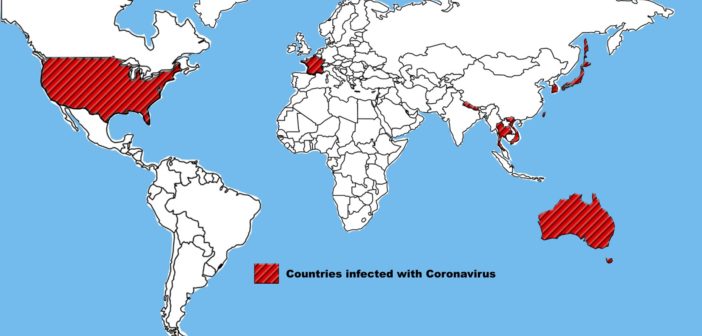It started in the streets of a wet market in Wuhan.
They thought it came from the fish. Now they’re saying it may have started with snakes. No one’s really sure. All that’s known is the coronavirus breakout has resulted in the quarantine of 50 million people across 17 cities in China, including Hong Kong.
And it’s spreading. According to the Washington Post, “Infections have been confirmed in France, South Korea, Japan, Nepal, Thailand, Singapore, Vietnam, Taiwan, Australia and the United States.”
On Jan. 24, a case of the coronavirus was confirmed in a 60-year-old woman in a Chicago hospital. The Chicago Tribune reported on Jan. 30 that she and her husband are the first confirmed cases of the virus spreading from person-to-person in the U.S.
Previous outbreaks
Despite the hysteria that seems to be surrounding the virus, Associate Professor of Biology Gregory Ruthig said that coronaviruses are actually quite common.
“You have probably had a coronavirus before,” said Ruthig. “Most of them cause something like a cold. And most people have had something like that, including here in the United States.”
Altogether, there are seven well-known strains of coronaviruses. The rising fear of this coronavirus, however, stems from the previous outbreaks of the virus. Those outbreaks caused hundreds of deaths.
“There have been two famous outbreaks in the past couple decades,” said Ruthig. “One of the strains in 2003 killed about 700 people. That was centered in southern China, like Hong Kong, and spread throughout Southeast Asia.”
That was named the SARS virus, short for the severe acute respiratory syndrome.
Ruthig adds that although there was a case of that strain that caused a fatality in Canada, it didn’t really affect the United States.
The second outbreak of the coronavirus was the Middle East Respiratory Syndrome, or MERS. According to the CDC, MERS was first reported in Saudi Arabia in 2012 before spreading to other countries, including the U.S. Many of those who became infected died from the virus.
What can be frightening about coronaviruses is that they can spread quickly. And with this latest case, in particular, no one has been able to identify how it started. MERS started with camels. SARS, originally thought to come from bats, originated in civets, a type of cat. But for this current strain, its origin is still unknown.
A global health emergency
On Jan. 30, the World Health Organization declared a global health emergency. There are over 200 deaths in China and more than 10,000 confirmed cases. The number of cases of this virus has now outnumbered the amount of SARS cases. The U.S. State Department issued a Level 4 travel advisory to China’s mainland and has advised citizens already in China to leave.
“There’s no vaccine, there’s no medicine for this thing,” said Ruthig. “There’s antivirals and there’s some treatments that you can do. But SARS was stopped not by a cure-all drug or a vaccine or anything like that. It was by quarantining people and by changing behavior.”
That’s why China has been quarantining cities. They have also postponed some of their biggest celebrations of the year, such as the Lunar New Year festivities, to stop the spread of the virus.
“By the time you’re symptomatic, you’re contagious,” said Ruthig. But the sooner those who are contagious are out of the public, the better the chances at stopping the virus from spreading.
“If we’re going to slow this thing down, it is going to be (through) a change of behavior. There’s no wonder drug coming in,” said Ruthig.
Wonder drug or not, Ruthig adds that there is one simple step that can help protect against the virus: washing your hands.
“Coronaviruses generally do really well on surfaces,” said Ruthig. “So to protect yourself, washing (your) hands works really well as opposed to the flu, which is all through the air.”
Ruthig also advises those who have more questions or anxieties over the virus to read the CDC’s and WHO’s websites. Recently, a study from Poynter found that there were three separate waves of misinformation that scientists were battling. Both the CDC and WHO are constantly updating their websites with accurate and verified information.

